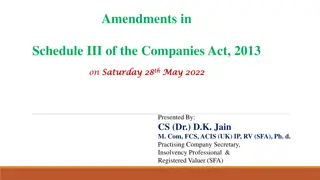Company Formation Process and Role of Promoters
A company is a legal entity separate from its members, formed for a common purpose. The formation involves stages like promotion, investigation, planning, and financing. Promoters play a crucial role in initiating and incorporating a company, conducting market research, preparing business plans, and securing finances. Understanding the meaning, characteristics, rights, duties, and legal position of promoters is essential in the formation of a successful company.
Download Presentation

Please find below an Image/Link to download the presentation.
The content on the website is provided AS IS for your information and personal use only. It may not be sold, licensed, or shared on other websites without obtaining consent from the author. Download presentation by click this link. If you encounter any issues during the download, it is possible that the publisher has removed the file from their server.
E N D
Presentation Transcript
COMPANY: FORMATION,PROMOTION AND INCORPORATION OF A COMPANY
What Is A Company? Meaning:- A company is a legal person or legal entity separate from, and capable of surviving beyond the lives of its members. In words of Justice James A company is an association of persons united for a common purpose.
I. PROMOTION: Promotion is the first stage in the formation of a company. The term 'Promotion' refers to the aggregate of activities designed to bring into being an enterprise to operate a business. It presupposes the technical processing of a commercial proposition with reference to its potential profitability.
STAGES OF PROMOTION: Stage 2 Investigation: They have to make enquiries in the market about the potentiality of the proposed business. Various facts, data and information shall have to be collected and the market has to be studied. Stage 1 Discovery of an Idea: At first the promoters will find out what shall be the purpose of forming the company. Such an idea can be formulated out of experience of their own or of others. The purpose must be meaningful having a practical basis otherwise all the efforts will be futile.
. Stage 3 Stage 4 Planning: Financing: After proper deliberation and computation of the facts, information, etc., a plan for the proposed business has to be prepared with details. Opinions of management consultants may be sought and a Project Report may be obtained. In advanced industrial countries there are professional promoters who do the promotional job. Finance is necessary from the early stage till formation of the company is complete. The initial money comes from the promoters themselves and also from underwriters, if any, to be reimbursed by the company out of its capital.
Promoter of A Company Meaning, Characteristics, Rights, Duties And Legal Position
. A promoter is a person or group of people who comes together with an idea for setting-up a business at a particular place and incorporates a company to achieve it. By the process called incorporation, a company comes into existence. A promoter can be an individual, an association or people, a company or a firm. After the idea to start a business, detailed investigations are done by the promoters to find out the weakness and the strength of the idea and; also determines the capital needed to start the business and also estimates operating expenses and income.
CHARACTERISTICS OF A PROMOTER 1. A promoter comes up with an idea for setting up a business or a company. 2. He initially investigates and makes sure about the future prospects of the company. 3. Various people are brought by the promoter who wants to associate with him to share the responsibilities of the company. 4. The documents for the incorporation of the company are prepared by the promoter. 5. Funds and capitals are raised by him, which lets the company going.
FUNCTIONS OF A PROMOTER 1. Promoter has to form ideas for the formation of the company and explore the possibilities for the company. 2. Promoter conducts negotiation for the purchase of the business. 3. Promoter collects the number for signing of the AOA and MOA. 4. Promoter decides the name of the company, the location of the registered office and the amount and the form of the share capital. 5. Promoter gets the MOA and AOA drafted and printed. 6. He arranges the minimum subscription for the company. 7. He also arranges the certificate of incorporation and the registration of the company.
. , Duties of Promoter: (i) To prepare and submit documents Memorandum, Articles and Prospectus. (ii) To see that all property and assets are taken over by the proposed company at reasonable prices and on justifiable terms. (iii) To disclose to the company or to the independent Board of Directors after the company has been formed secret profits, if any, enjoyed by them as vendors.
. . Status of Promoter: A promoter stands in a fiduciary position with the company which he promotes. But he is neither an agent nor a trustee to the future company. The reason is obvious, there cannot be an agent of a person not in existence, nor there can be a trustee for a non-existent beneficiary. Even then, the principles of agency and trusteeship are returned to the care of a promoter.
. . Liabilities of Promoter: A promoter may be made liable in a suit by an aggrieved shareholder or debenture holder for damages for deceit, besides, being liable for compensation. A promoter, even though he may only act as agent or trustee, is personally liable for the contract on behalf of the company. A promoter is liable to pay compensation for misstatements in prospectus, for non-disclosure of any matter in the prospectus and for non- compliance of the provisions under Sec. 56.
. . Rights of Promoter: (i) They are entitled to take assistance of the experts in preparing the documents. (ii) They can enter into preliminary or pre- incorporation contracts on behalf of the proposed company. (iii) They may claim reasonable remuneration for their services.
I. INCORPORATION: After Promotion, the second stage in the formation of a company is the registration or incorporation. The promoter of a company should perform the following functions for getting the company registered under the Companies Act.
STEPS OF INCORPORATION: Step 1 - Approval of the Proposed Name of the Approval of the Proposed Name of the Company Company Before the company is registered, it is essential to obtain the approval of the Registrar to its proposed name. There is a specific application form for this purpose. The promoter generally selects a few suitable names in order of preference and apply to the National Company Law Tribunal through the Registrar of the State.
Step 2. Documents to be Filed with the Registrar during registration: 1. An Advocate of the Supreme Court or High Court. 1 1. . Memorandum Memorandumof ofAssociation Association 2. An Attorney or Pleader who is entitled to appear before a High Court. The Memorandum should be printed and at least seven persons each agreeing to take at least one share must subscribe their names to Memorandum. 3. A Chartered Accountant who is engaged in formation of the company and also practicing in India. 2 2. .The TheArticles Articlesof ofAssociation Association 4. Any individual who is named in the Articles of Association as the Company s Director, Manager or Secretary. The Articles must also be signed by at least seven members. If a public company doesn t prepare and file Articles, then it is deemed to have adopted Table A in Schedule I of the Indian Companies Act. 6 6. .Notices Noticesof ofthe the Address Addressof ofthe the Registered RegisteredOffice Office The notice for the address of the registered office of the company should be given within 30 days after its incorporation or on the date from which the company commences its business whichever is earlier. 3 3. .List Listof ofDirectors Directors A complete list of directors, their addresses and occupations and age. If not separate list is filed, the subscribers to the Memorandum are deemed to be the first directors. 7 7. . A A Letter Letter of of Authority Memorandum Memorandumand Authority for and Articles Articles for Making Making Necessary Necessary Corrections Corrections in in 4 4. .Consent Consentof ofthe the Directors Directors A letter of authority on a non-judicial stamp paper of the requisite value signed by all the subscribers in favour of one of them or any other person for making necessary corrections, on their behalf, in the Memorandum and Articles and other papers is to be filed with the Registrar of Companies. When Directors of a Company are appointed by the Articles of Association or named in the prospectus, a written consent to act as directors and also a written undertaking to take up and pay for the qualification shares if any are mandatory in Incorporation of a Company. 8 8. .Letter Letterof ofRegistrar Registrarof ofCompanies Companiesabout aboutthe the Availability Availabilityof ofName Name 5 5. .Statutory StatutoryDeclaration Declaration Notarized original copy of Registrar of Companies stating the availability of the proposed name is mandatory while registering a company name. It should be filed with the Registrar of Companies. However, the requirements as given in points 3 and 4 above shall not apply to private companies. A statutory declaration by any one of the following persons stating that all the requirements of the Act regarding Registration have been duly complied with:
. 3 3. .Payment Payment of Along with the above-detailed documents, the registration and filing fee as per the rates prescribed in Schedule X to the Companies Act, 1956 are to be paid. 4 4. .Registration Registrationof of the theCompany Company The Registrar of Companies will then verify the documents submitted for registration. If there are any discrepancies found, concerned person was called to visit the Registrar s office to rectify the errors in the documents. If the documents for registrations are found in order, the Registrar will register the company and a Registration number is allotted. ofNecessary Necessary Fees Fees
Certificate of Incorporation Certificate of Incorporation After the above documents are filed with the Registrar and the prescribed fees are paid and the Registrar is satisfied that all the requirements of the Act regarding the registration have been complied with, he will register the documents and retain them. The Registrar will then issue a certificate known as Certificate of Incorporation and enter the name of the company in the Register kept in his office. This Certificate of Incorporation entitles the company as a legal person. In other words, the company is born upon Incorporation. the issue of Certificate of
Capital Subscription Stage Capital Subscription Stage A private company or a public company not having share capital can commence business immediately on its Stage and Commencement of Business Stage are relevant only in the case of a public company having a share capital. Such a company has to pass through these two additional stages before it can commence its business. incorporation. Capital Subscription The capital subscription stage deals with the task of obtaining the necessary capital for the company. For this purpose, immediately after the incorporation, a meeting of the Board of Directors is conducted to deal with the following business: 1. Appointment of the secretary. In most cases, the appointment made at the promotion stage is confirmed. 2. Appointment of Bankers, Auditors, Solicitors and Brokers etc. 3. Adoption of draft Prospectus / Statement in lieu of Prospectus . 4. Adoption of underwriting contract, if any.
Commencement of business Commencement of business As soon as a private company gets the certification of incorporation, it can can commence its business. A public company can commence its business only after getting the certificate of commencement of business . After the company gets the certificate of incorporation, a public company issues a prospectus for inviting the public to subscribe to its share capital. It fixes the minimum subscription. Then it is required to sell the minimum number of shares mentioned in the prospectus. After completing the sale of the required number of shares, a certificate is sent to the Registrar along with a letter from the bank stating that all the money is received. The Registrar then scrutinizes the documents. If he is satisfied he issues a certificate known as Certificate of Commencement of Business . This is the conclusive evidence for the Commencement of Business.
REFERENCES- accountlearning.com learn.quicko.com lawcorner.in

















































